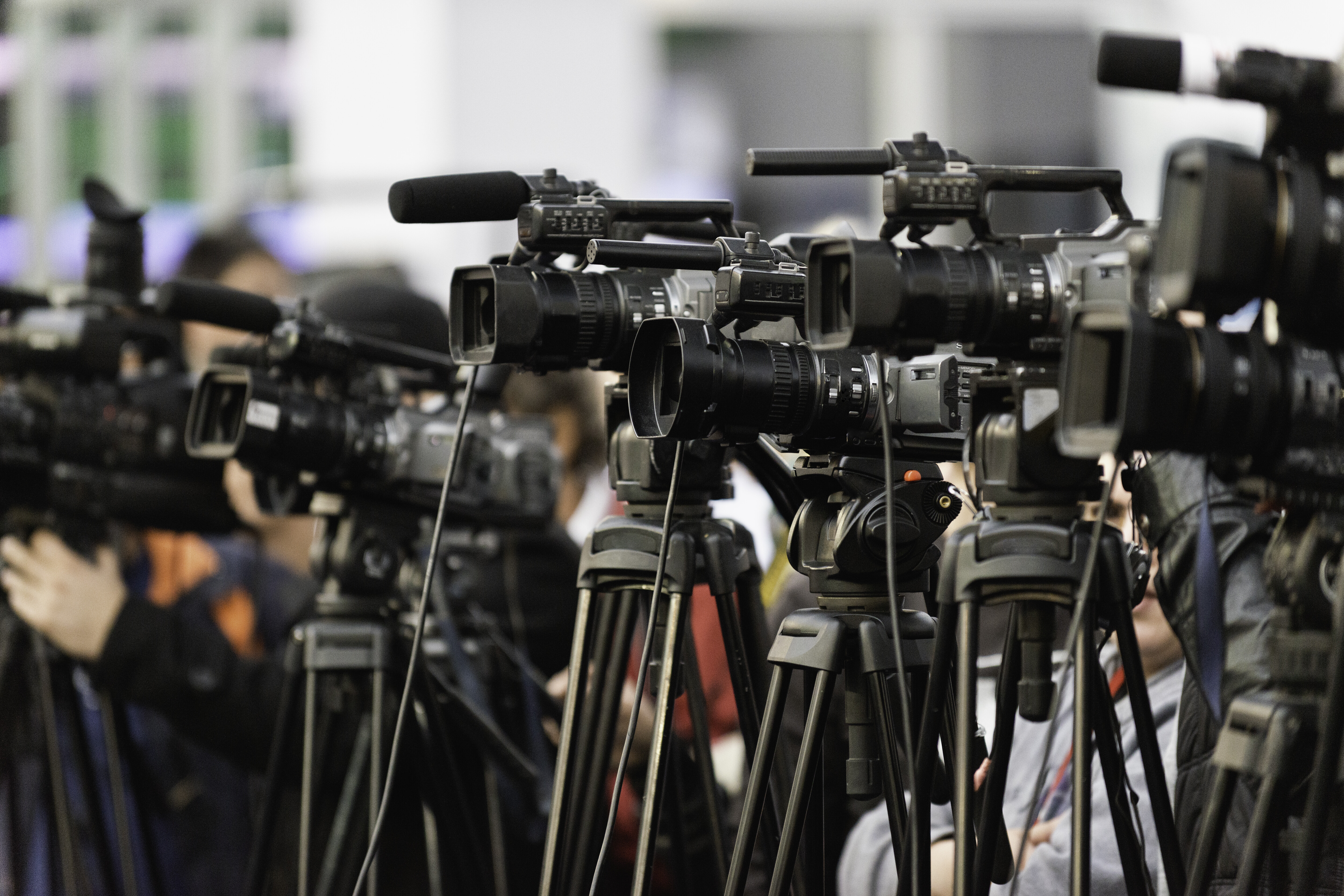Our weekly round-up of public service media related stories and headlines from around the world.
Click on the drop-down menus below to reveal the latest regional stories.
EGYPT: Egypt intelligence reaps huge profits from ‘media development’
MEMO: Egypt’s General Intelligence Service has earned around five billion Egyptian pounds (about $2.9 billion) from a recent consulting deal signed between the government and the Egyptian Media Group.
GHANA: Elections, Internet Shutdowns and the Ghana Example
MFWA: Elections are one of the most distinctive features of democracy, and so is free expression. The two, thus, go together. However, instead of expanded spaces for expression during elections, some African governments tend to shrink such spaces during elections.
AFEX: The African Freedom of Expression Exchange (AFEX) has joined other global press freedom organisations to call on the government of Nigeria to ensure that access to the Internet, social media platforms, SMS and all other associated communication services is unrestricted throughout the electioneering period.
NIGERIA: How fake news was weaponized in Nigeria’s elections
CNN
NIGERIA: Nigerian election campaign “polluted” by disinformation
RSF: Reporters Without Borders (RSF) is disturbed by the level of disinformation and propaganda seen during the campaign for tomorrow’s general elections in Nigeria, in which 84 million citizens are due to vote, and calls on the nation’s authorities to undertake to defend journalists and quality journalism.
SOUTH AFRICA: DA expects SABC loan guarantee in budget speech
SABC News: The DA says it expects Finance Minister Tito Mboweni to announce a loan guarantee for the South African Broadcasting Corporation (SABC) in his budget speech on Wednesday.
SOUTH AFRICA: SABC introduces new economics show
The Citizen: The show apparently seeks to include ordinary South Africans in purposeful and well-informed discussions about the economy.
SOUTH AFRICA: The delay of SABC Board appointments deepens crisis
Media Monitoring Africa: The latest action by the Portfolio Committee to delay the appointment of new SABC Board members, not only flies in the face of their promises to expedite the process, it constitutes a gross dereliction of duty and a violation of their oath of public office.
SUDAN: At least 79 journalists arrested in two months of protests in Sudan
RSF: RSF has so far registered a total of 79 media personnel arrests since the protests against an increase in the price of bread began on 19 December and then quickly grew into angry demonstrations against the regime.
SUDAN: Media coverage of protests stifled by arrests and targeting of newspapers
RFI: A crackdown on the media in Sudan is hitting press coverage of the continuing protests against President Omar al-Bashir and his government, according to Reporters Without Borders.
TANZANIA: Unesco calls on govt, stakeholders to promote radio independence
The Citizen
TUNISIA: Citizens Testing Right-to-Information Law
HRW: Tunisia’s first freedom of information law, approaching its third anniversary, significantly advances the rights of citizens to get information from publicly funded institutions, Human Rights Watch said today. The law’s real impact, however, depends on the actual authority of a body created to compel responses from uncooperative institutions.
ZIMBABWE: Zimbabwe to repeal draconian media law
The East African: Zimbabwe plans to repeal a draconian media law that was used by former strongman Robert Mugabe’s government to deport foreign journalists and shut down critical local media organisations.
GENERAL: The spectre of Cambridge Analytica still haunts African elections (Opinion)
Aljazeera: Funding for social media advertising and manipulation could determine the outcome of Nigeria’s February 16 vote.
CHINA: Will Chinese firm’s stake in Reddit normalise censorship? (Opinion)
The Guardian: Rights activists have justifiable concerns about investment in western media companies.
ABU: Hong Kong will finally pull the plug on analogue television services by the end of next year, eight years after the original target date as it catches up with the global trend of going fully digital.
INDIA: Chhattisgarh’s plan for journalist safety law could be template for all India
CPJ
INDIA: DD Free Dish fills 40 slots through e-action
Rapid Tv News: Indian public broadcaster Prasar Bharati has allocated slots for 40 channels on direct-to-home (DTH) platform DD Free Dish following an e-auction earlier this month.
INDONESIA: In Indonesia, young and old share fake news on social media
Jakarta Post: Recent research from the US shows that baby boomers or people over 65 years old with conservative political views are more likely than other age groups to share fake news through social media. Not in Indonesia…
JAPAN: NHK fee collector leaves threatening notes on people’s doorsteps
Japan Today: Many people in Japan have long had a tumultuous relationship with the country’s public broadcaster, NHK. Ever since the government decided it was the station’s own responsibility to collect funding from the public, the troubles began.
NEPAL: Proposed legislation muzzles free speech on social media
IFJ: The Nepal government has drafted new legislation that will impose harsh penalties for posting content on social media deemed ‘improper’.
PAKISTAN: Pakistan announces crackdown on social media misuse
The News International: Information Minister Fawad Chaudhry has said that the government will soon launch a crackdown on the hate mongers misusing social media.
PHILIPPINES: Fact-checking website launched in time for the Philippines’ May 2019 elections
OpenGov: Tsek.ph is a website that will be the repository of fact-checking claims, made in connection with the May 2019 elections.
PHILIPPINES: Law used against journalist Maria Ressa stirs fears among Filipinos: It could target ‘all of us’
Los Angeles Times: The cyber libel law, which applies to speech online and carries far more serious penalties than ordinary libel, provides Duterte and his supporters a powerful tool to go after perceived enemies.
PHILIPPINES: Maria Ressa: editor of Rappler news website arrested on ‘cyber-libel’ charges
The Guardian: Philippines president Duterte government accused of shameless persecution
SRI LANKA: Transforming State Media into Public Media
Sunday Observer: Committee appointed to facilitate process.
THAILAND: Thai TV channel suspended for 15 days in major blow to pluralism
RSF: Voice TV viewers will be watching blank screens for the next two weeks as a result of the order announced today by Lt. Gen, Perapong Manakit, the head of the National Broadcasting and Telecommunications Commission, who blamed “provocative” content in two of its programmes without giving any detail.
AUSTRALIA: ABC starts search for new managing director, even as Guthrie dismissal case continues
ABC News: The ABC board has advertised for a new managing director to replace Michelle Guthrie, even though a new ABC chair is yet to be appointed.
AUSTRALIA: Could Married At First Sight be part of Australia’s soft power push in the Pacific?
ABC: Australia has a new strategy to win over its Pacific neighbours: reality television.
AUSTRALIA: SBS, Blink TV secure Australia’s Eurovision participation to 2023
Rapid TV News: Public broadcaster SBS and production partner Blink TV have inked a five year deal to secure Australia’s place in the Eurovision Song Contest until 2023.
AUSTRALIA: TV industry calls for Facebook news feed transparency and journalism tax breaks
The Guardian: Broadcasters tell ACCC that Facebook and Google algorithms should be regulated and they should pay fair rate of ad revenue.
NEW ZEALAND: Media big and small step up to keep fires covered
RNZ: The Nelson Tasman fires were a major challenge for the big media outlets to cover with no idea how bad it would get or how long they would last. Local media also played a crucial role too – including one station whose HQ was in sight of the flames.
NEW ZEALAND: Move to introduce digital tax for foreign companies profiting online
RNZ: It will target social media companies like Facebook, content sharing sites like YouTube or Instagram, those that offer intermediary services like Uber, Airbnb and eBay and others that earn income from online advertising.
NEW ZEALAND: TVNZ hints at bold digital moves
RNZ: Two years ago Treasury warned the government it might have to prop up state-owned TVNZ as soon as 2021 – because it was falling behind in an industry in sharp decline. This week the broadcaster’s top brass told Parliament about a “renaissance” in free-to-air TV and fielded questions about taking over rivals.
POLYNESIA: In Polynesia, the announced cancellation of France O generates discontent (French-Paywall)
Le Monde: While the channel should close in September 2020, the visibility of the overseas territories is a new “challenge” for France Televisions. Several projects are on the table.
WEST PAPUA: International award for film about journalism in West Papua
RNZ: A short documentary which highlights the risks of being a journalist in Indonesian-ruled Papua region, or West Papua, has won an international film award.
REGIONAL: Pacific group aims to strengthen reporting on corruption
RNZ: A new anti-corruption regional media group hopes to strengthen checks and balances around good governance in the Pacific.
CZECH REPUBLIC: Czech Journalists Form Own Branch Of International Media Watchdog
EJO: A new section of the global media watchdog International Press Institute (IPI) has been set up by a group of Czech journalists determined to tackle threats to media freedom in their country and to promote the cause of independent quality journalism.
ESTONIA: Newspaper Association wants ad-free local papers
ERR: According to the Estonian Newspaper Association, publications of local councils shouldn’t be allowed to earn money by selling ad space.
FINLAND: Yle Areena tops Finland’s most valued internet brand list
Yle: In a new survey, Yle Areena has been voted Finland’s top internet brand, beating out entertainment giants such as Netflix.
FINLAND: YLE: to inform, educate, entertain and… well, that’s still it?
EBU: For this month’s blog on digital transformation among our Members we asked Mika Rahkonen, Head of Strategy at Yle for his Top 6 wishes for 2019.
FRANCE: French media in crisis as they face their own #MeToo moment
The Guardian: The scale of online abuse by ‘boys’ club’ Ligue du Lol has sent shockwaves through society.
HUNGARY: More children, fewer media outlets – Viktor Orbán’s plan for Hungary
ECPMF: Hungary’s Prime Minister Viktor Orbán continues to defy the European Union’s attempts to curb the political takeover of independent media.
MOLDOVA: Facebook Shuts Moldova Officials’ ‘Fake News’ Accounts
Balkan Insight: With the help of a local app, the social media giant has closed a number of page and accounts – some linked to government officials – accused of spreading fake news, disinformation and impersonation.
NETHERLANDS: Dutch govt considering different plans for public broadcaster NPO
Telecompaper: The Dutch government is investigating the possibilities of making the NPO an advertising-free public broadcaster, the Telegraaf reported, citing sources in the Hague.
POLAND: Poland’s media battle gets political
Politico: The fight over the country’s most powerful television channels could have a crucial impact in upcoming elections.
SPAIN: Rosa María Mateo will exceed the provisional mandate at RTVE (Spanish)
PRNoticias: The lack of agreement in RTVE to appoint a new Board of Directors and the situation of stagnation after several candidates have submitted two appeals to the selection process, have led Rosa María Mateo, temporarily appointed sole administrator, to remain in charge of the Corporation for more than expected
SPAIN: Telefónica demands end to RTVE tax
Advanced Television: Spain’s Telefónica has requested that the 0.9 per cent telco tax it pays to finance public TV group RTVE is eliminated to put an end to a “discrimination” against telco companies.
SWEDEN: Difficult for teenagers to identify fake news online
Nordicom: According to a new study published in Nordicom Review, many young people in Sweden find it difficult to identify fake or partial news online. The young people who considered themselves good at finding information online were the ones who did worst in the survey.
UK: BBC launches eco-friendly fashion and lifestyle brand
The Guardian: BBC Planet seeks to capitalise on Attenborough’s warnings about ecological catastrophe
UK: BBC leadership urged to be ‘brave’ on older viewers’ free TV licence
ITV News: BBC bosses have been urged to be “brave” and tell the Government to take back responsibility for giving the over-75s free television licences.
UK: BBC provides abortion information after Call the Midwife row
The Guardian: BBC had said it could not offer advice because abortion was a ‘contentious’ issue
UK: Facebook needs regulation as Zuckerberg ‘fails’ – UK MPs
BBC News: Facebook needs far stricter regulation, with tough and urgent action necessary to end the spread of disinformation on its platform, MPs have said.
UK: UK newsrooms increase efforts to tackle online harassment
IPI: IPI report highlights measures ranging from step-by-step guidelines to trauma management
UKRAINE: Patience, commitment needed to transform Ukraine’s Public Broadcasting Company (Opinion)
The Ukrainian Weekly: If politics wasn’t behind the dismissal of public broadcasting chief Zurab Alasania, then the shifting of its date until after the March 31 presidential election was.
UKRAINE: Scandalous firing of public broadcaster CEO delayed until after election (Paywall)
Kyiv Post: The supervisory board of Suspilne Telebachennya (Public Television) late on Feb. 12 postponed the firing of its CEO Zurab Alasania
REGIONAL: Media freedom in SEE on decline as concentration of media ownership continues – UNESCO
SeeNews: Media freedom across Central and Eastern Europe (CEE), and Southeast Europe (SEE) in particular, has seen a general downturn as efforts to control it increased and concentration of media ownership continued, the UN’s cultural agency UNESCO said in a recent report.
GENERAL: Ensuring the financial sustainability of quality journalism
Council of Europe: The Council of Europe has called on its 47 member states to ensure the financial sustainability of quality journalism taking into account that it is a public good and plays an essential role for ` to be able to form and express their opinions and make informed choices about government and society.
ANTIGUA & BARBUDA: Media workers reflect on the importance of Radio on World Radio day
The Daily Observer: As the world celebrates the impact of radio on World Radio Day, media workers in Antigua and Barbuda are convinced that radio will continue to be the strongest media platform.
Knight Center: A country marked by high media concentration, Brazil has seen its journalism market diversify in the last decade with the arrival of international organizations. The latest example is CNN, which licensed its brand to a new Brazilian company — with a promise of 400 new jobs for journalists.
MEXICO: The spread of fake news has had deadly consequences in Mexico. Meet the people trying to stop it.
Pacific Standard: After an incorrect report spread on WhatsApp, a mob lynched two men in Acatlán de Osorio, Mexico. Fact-checkers came in and tried to uncover the truth of what happened.
Knight Center: This type of journalism would rely heavily on citizen journalism, the people of Nicaragua and social networks, Ramírez said. “We are going to have reporters on the ground in the country sending it (the news) to Costa Rica where they’re going to be broadcast. That is the way, I think, things are going to function.”
TURKEY: Courts being used to strangle media freedom
Amnesty International
TURKEY: No progress toward media freedom in Turkey, IPI report finds
IPI: Mission sees no improvement for journalists following end to state of emergency
CANADA: Canadians divided on trust in media, government, business, NGOs: report
Vancouver Sun: The 2019 Edelman Trust Barometer found more Canadians are trusting in 2019, but the informed public and mass population feel differently.
CANADA: CBC/Radio-Canada doubles down on kids programming
CBC/Radio-Canada: Canada’s public broadcaster announces expanded commitment to young audiences.
US: Alaska governor’s draft budget zeros out pubmedia funding (Paywall)
Current: Alaska Gov. Mike Dunleavy proposed a budget Wednesday that would eliminate funding to 27 public media stations statewide.
US: And Now A Return To Our Regularly Scheduled Programming (Opinion)
NPR: When a U.S. president schedules a Rose Garden announcement to talk about declaring a national emergency, it’s a pretty safe bet that NPR will carry it live.
US: How can local TV news fix its young person problem? Maybe it needs to look more like Vox
Nieman Lab: “While remixing the stories did not resonate every time, we did see positive results on the group of hard news stories where we altered the storytelling approach.”
NiemanLab: “This is almost a plague in this county. Why wouldn’t we want to raise awareness and do it in a way that really had an impact?”
US: PBS KIDS and PBS KIDS Producers Win Six Kidscreen Awards
PBS: Winners of the 2019 Kidscreen Awards were announced on Tuesday, February 12 during the Kidscreen Summit in Miami.
US: With more freedom on podcasts, pubmedia producers seek middle ground on commercial tone (Paywall)
Current: FCC laws limit commercialism on public media airwaves. But it’s less clear what compels stations to maintain a noncommercial vibe on digital platforms.
Acing the algorithmic beat, journalism’s next frontier
NiemanLab: In a world where key decisions are increasingly driven by algorithms, journalists need to take a closer look at how they work and how they impact individuals and society. here’s how the wall street journal is approaching it.
Journalism.co.uk: While 360-video works as an ’empathy engine’, this unique and intimate insight into the life of female inmates also comes with ethical challenges.
EU reaches agreement over controversial copyright rules
Digital TV Europe: The European Commission has reached an agreement over new copyright rules, including the controversial Article 13 that will require platforms like YouTube to tackle copyright infringements at the point of upload.
Facebook labelled ‘digital gangsters’ by report on fake news
The Guardian: Company broke privacy and competition law and should be regulated urgently, say MPs
Kermit is Credible, and this is good for news
Misinfocon: Approaches to tackling misinformation for the year ahead.
Trends and challenges in data journalism in 2019
IJNet
PSM Weekly is available via email. You can subscribe by signing up to our mailing list at the bottom of the page or email editor@publicmediaalliance.org.
All PSM Weekly stories are provided for interest and their relevance to public service media issues, they do not necessarily reflect the views of the Public Media Alliance.
All headlines are sourced from their original story.
If you have any suggestions for our weekly round-ups, please email PMA at editor@publicmediaalliance.org.
Header image: Empty television studio with camera. Image: Grafissimo/iStock


